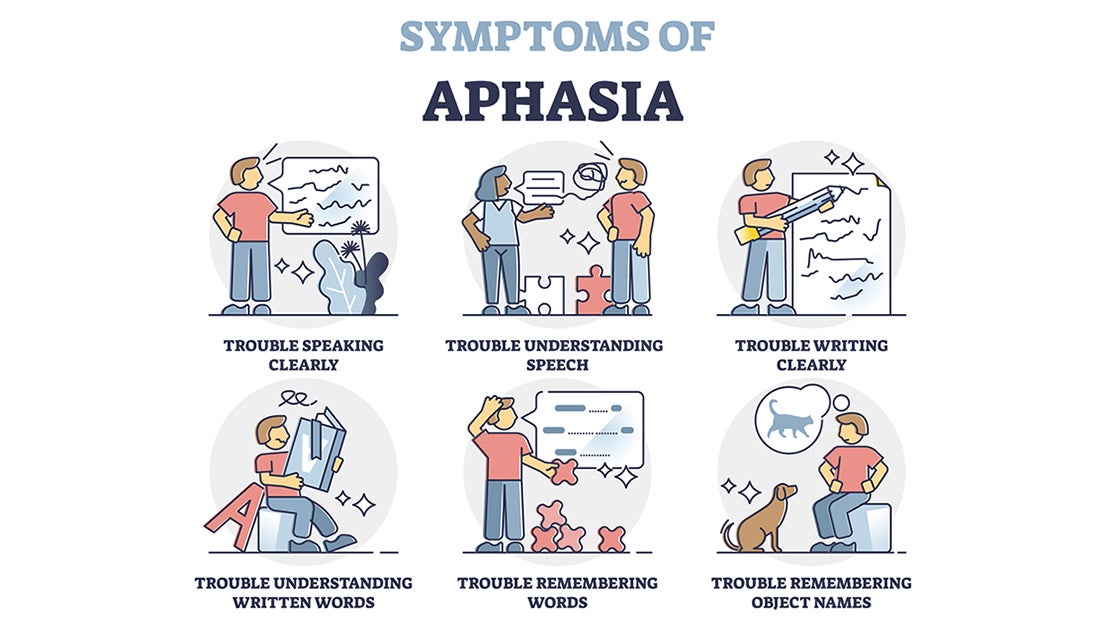
Speech Language Pathology Manager at Lovelace Rehabilitation Hospital, Jennie Saavedra Duran, M.S., CCC-SLP joins us today to talk about a common communication disorder many stroke patients face to better understand Aphasia and how speech therapy can help both patients and their loved ones.
What is aphasia?
Aphasia is defined as the acquired inability to communicate using written, spoken or sign language. For most people, this means they have difficulty reading and writing. It can lead to psychological and interpersonal complications for those affected, as well as for their support system of family and friends. People with aphasia are often aware of these difficulties in communicating with others. Many times, patients trying to overcome this new language barrier experience embarrassment, depression and problems in relationships.
Aphasia typically occurs after a stroke, head injury, brain tumor, infection or degenerative diseases, resulting in damage to areas of the brain responsible for controlling language. Stroke is the most common cause of aphasia, and it has been estimated that about 20 to 40 percent of stroke patients develop aphasia.
Some patients may recover from aphasia after stroke within a matter of hours or days following onset. Researchers believe the duration of spontaneous recovery can be extended up to six months after the onset of symptoms and various forms of speech and language therapies.
According to the National Aphasia Association, the disorder affects about one in every 250 people, most commonly older individuals. Approximately 80,000 adults in the U.S. become aphasic each year, with one million people currently living with aphasia. Risk for aphasia increases significantly with age. Each advancing year increases a person’s risk 1 to 7 percent. In one study, 15 percent of individuals under the age of 65 experienced aphasia. However, in the group of patients 85 years of age and older, 43 percent were aphasic. Researchers say, however, there is not enough data available to evaluate differences in the incidence and clinical features of aphasia among gender and races.
Treatment for aphasia
Not all affected by aphasia require treatment. If the brain damage is mild, a person may regain all their previous language skills without treatment. However, most people undergo speech and language therapy. This helps to rehabilitate their language skills and supplement their communication experiences.
It can be a slow process, however, and few people regain pre-injury communication levels. Unfortunately, for patients experiencing symptoms more than two or three months after a stroke, a complete recovery is unlikely.
Treatment for aphasia is centered around speech therapy that focuses on relearning and practicing language skills. It also involves teaching patients alternative or supplementary communication methods. The purpose of speech therapy is to help the patient to fully utilize their remaining skills to the best of their ability, while also learning new ways of communicating. Speech language, however, should not be viewed as a means to a “cure.”
Rehab takes time
Rehabilitation, as mentioned, can be a slow process, both for the patient and family to fully understand the nature of aphasia and learning compensatory strategies for communicating. It is important to note the role patients' families play in the rehabilitation process. An interested and involved spouse, family or communication partner supports the recovery process.
It is natural for some of the potentially negative reactions like overprotectiveness, hostility, anger, unrealistic expectations, lack of knowledge and inability to cope with practical difficulties. There is often a natural tendency by family members to minimize the patient's communication impairment particularly, in the early stages of recovery. Therefore, in addition to improving the patients' communication, treatment needs to be aimed to support the family and friends as well.
Patients can recover from aphasia spontaneously, on their own without treatment, in a mild case. There is no guaranteed cure. The purpose of speech therapy is help the patient fully utilize the remaining skills and to learn compensatory skills.
To learn more about inpatient and outpatient services available at Lovelace Rehabilitation Hospital, please visit here.




